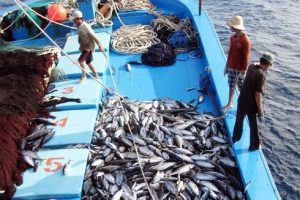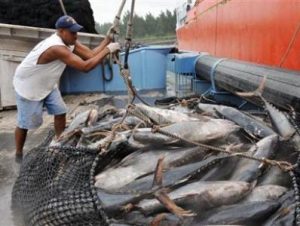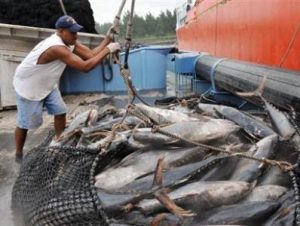

By Godwin Oritse, Dapo Olawuni, Ismail Aniemu, Olu Philips, Ezinne Asinobi, Imba Sunday, Olubiyi Omidiji.
INTRODUCTION
While the concept of blue economy promises improved benefits to maritime states and coastal communities, there have been some identified gaps that should be filled to erase identified impediments capable of reducing the gains of marine endowments.
One major identified setback is IUU fishing, a short form of describing Illegal, Unregulated and Unreported fishing, which is a notable maritime crime that impacts adversely on marine ecosystems through pollution, over fishing and reduction in the expected gains from blue economy.
An October 31, 2018 report of The Guardian newspaper that decried the menace estimated an annual loss of $2b in the Gulf of Guinea to the crime which is a fallout of underutilisation of the massive ocean resources in the area .
As at 2023,the losses have increased up to five times to the tune of $10b in 2023 thereby affirming an increase in the crime as perpetrators got more audacious defying detering actions deployed by States and multilateral bodies established to promote maritime security.
The influx of foreign fishing trawlers in the Gulf of Guinea, GoG, has remained a source of worry to stakeholders and countries within the region.
Chinese vessels have been found to be the most notorious in this crime across various maritime zones where domain awareness have been put to test

Illegal Unregulated and Unreported (IUU) fishing has also pitched local fishermen and women against foreign trawlers, a development that has continued to deplete the resources of the GoG.
The World Bank defines the Blue Economy as the sustainable use of ocean resources for economic growth, improved livelihoods and jobs, and ocean ecosystem health.
Recent research has shown that throughout West Africa, the proliferation of more than 50 Chinese-owned fishmeal factories, fueled largely by illegally caught fish, has polluted popular tourist destinations, driving away tourists and depriving the countries of revenue. Overfishing leaves artisanal fishermen with empty nets, significantly reduces income and food, and devastates marine resources necessary to replenish fish
stocks.

SLOW PACE OF GoG STATES’ DOMESTICATION IUU CONVENTION
Speaking on the development, Mr. Emmanuel Maiguwa, President of Maritime Security Providers Association of Nigeria, MASPAN, said that the international convention on the Illegal Unregulated and Unreported fishing had not deterred foreigners from the region.
He attributed the inability of countries in GoG to domesticate the IUU convention into their municipal laws for the reason offenders could not be criminalised and prosecuted.
Maiguwa also said that convention on IUU was administrative and not punitive, explaining that the administrative punishment was to pay a fine as sanction.
He stated that nothing much could be done until countries within the region ensured that the IUU convention was legislated upon and made part of their municipal laws.
UNREST DUE TO IUU PERPETRATORS RESISTANCE/FIGHT BACK
Gulf of Guinea nations have banded together earlier last year to crack down on illegal fishing, which environmental groups blame on Chinese boats that are decimating West Africa’s fish stocks and fishing communities along the coastline.
Chinese boats are decimating West Africa’s fish stocks and fishing communities in the Gulf of Guinea, say environmental groups. The Institute for Security Studies, a South African think tank, said the communities could be losing more than $2 billion each year to illegal fishing, mainly from Chinese-owned boats.
Local community leaders and fishermen blame the problem in part on techniques that catch fish before the fish are fully developed. The Environmental Justice Foundation said illegal fishing boats in Ghana use Ghanaian flags, but 90% were traced to Chinese owners. China has repeatedly denied wrongdoing, with one article in the state-affiliated Global Times newspaper last year rejecting what it called “Western media rumors” of China’s illegal fishing and saying Beijing had tightened oversight of deep-sea fishing boats.
In June 2017, a total of 19 African countries launched an EU-funded network to tackle piracy, high seas robbery, kidnappings and human trafficking in the strategically important Gulf of Guinea. Earlier this year, Gulf of Guinea nations joined forces to crack down on illegal fishing. Benin, Ghana and Togo agreed to joint patrols and information-sharing with support from the European Fisheries Control Agency through a center in Accra, Ghana. But the agency’s executive director, Susan Steele, said more efforts are needed. “Legislation, operations, training and cooperation,” she said. “One of the key things you want to be looking for is to make sure there are consequences for the people doing illegal fishing.” Some fishermen have reported that the joint patrols seemed to be helping, and fish stocks are showing signs of improvement.
Though not within the Gulf of Guinea, the Somalian experience where vessels involved in the IUU crime fight back to continue their illegal act speaks to what coastal communities face in the area while trying to confront the menace
Speaking on the development, Mr. Abdifatah Mohamed, Director, Department of Environment, Somali Maritime Administration said that the foreign fishing trawlers in Somalia initiated the menace of piracy that almost ran the Somalian Government aground.
Mohamed explained that at a point in time local fishermen could not fish because foreigners had swept everything away ,leaving nothing for the locals.
He further said that when the locals tried to confront the foreign trawlers, they were sprayed hot water from pumps, adding that at that point locals took up arms against the foreign fishing trawlers thereby degenerating into a war between foreigners and locals.
He said: “At that point the government had to confront the foreign fishing trawlers and told them to stay away from the territorial waters of Somalia as the government will take responsibility for any harm done to their vessels and their crew.
“This was how the foreign fishing trawlers left the Somalian waters for the safety of every stakeholder including the locals”
The Chinese fleet has been taking the profits of the fisheries for 30 years and the impact on fish stocks has been terrible,” Stephen Akester, an advisor to Sierra Leone’s Ministry of Fisheries and Marine Resources, told the International Forum For Rights And Security, which in March 2022 published a report detailing the many ways China’s distant-water fishing fleet depletes marine resources around the globe.
“The resources are disappearing, fishermen are suffering, and families are starving,” Akester added. “Many have just one meal a day.”
According to the Ocean Science Foundation, African nations lose an estimated $10 billion annually to illegal trawlers, the majority of which are Chinese. China commands the world’s largest distant-water fishing fleet and, according to the IUU Fishing Index, is the world’s worst IUU offender.
President of Nigerian Trawler Owners Association (NITOA) Mrs Ben Okonkwo noted that IUU fishing poses a direct threat to food security and socioeconomic stability in Nigeria and other parts of the world.
Mrs Okonkwo urged the Federal Government do more to grow the fishing industry in Nigeria.
According to her, there is the need to establish Fisheries Terminal in Lagos where about 95% of the industrial fishing operators are based.
In Senegal, 90% of the country’s fisheries now are fully fished or facing collapse, according to the United Nations. Senegal’s fish mostly are caught by large foreign trawlers and exported to Asia and Europe, often as fishmeal or fish oil produced at Chinese-owned factories. That means the country earns little from fish caught in its waters.
In Ghana, illicit fishing threatens to destroy small pelagic fish populations, such as sardinella, which has dropped 80% in the past two decades, the Environmental Justice Foundation reported. Officials are trying to fight illegal fishing and other sea crimes while boosting the country’s blue economy through the new National Integrated Maritime Strategy.
EXISTING STRATEGIES TO PROTECT THE FISHING BUSINESS IN GULF OF GUINEA
The strategy was developed with support from the Centre for Maritime Law and Security Africa and the United Nations Office on Drugs and Crime, with funding from Denmark. It aims to strengthen maritime governance and security, protect marine and coastal environments, and develop regional and international cooperation on maritime issues.
Experts say political will is required to enhance maritime security and boost the continent’s blue economy.
Artisanal fishermen in Sierra Leone, where illegal fishing costs the country about $29 million a year, long have bemoaned the government’s lack of commitment to end IUU fishing.
Sea crimes in Sierra Leone primarily are committed by large industrial trawlers, about 75% of which are connected to China, according to estimates by China Dialogue Ocean. In 2016, the European Union issued Sierra Leone a yellow card after concluding that the country’s level of development and engagement against IUU fishing was inadequate.
In 2021, Sierra Leonean officials signed a controversial deal with China to develop an industrial fishing harbor on 100 hectares of beach and protected rainforests. Conservationists say no one conducted social or environmental impact assessments on the project.
Locals worry the harbor will draw even more foreign industrial trawlers, which will take their fish and income and drive away tourists.
SOCIAL SCARS
Because one crime holds the potential to breed more crimes IUU has left some unpleasant social effects on coastal communities like fueling prostitution either through sex for fish or sex for money.
Some of the fishermen who capitalise on the poverty levels in these coastal areas ride on the vulnerability of young ladies who either eventually get pregnant to have children whose fathers are not known or get lured into full blown prostitution
SOLUTIONS
Mrs Nneka Obianyor, former registrar of ships at Nigerian Maritime Administration and Safety Agency (NIMASA) in April 2023 said that only 160 fishing trawlers are registered and flagged in Nigeria.
As part of the short time solutions, there should be a collaboration between NIMASA as the apex regulatory agency registering vessels and the department of fisheries at the Ministry of Agriculture, ensuring that any fishing trawler for registration must obtain necessary documents from the ministry.
It should also be made mandatory that any vessel with over 100GT must have IMO number, without this, they must not fly the Nigerian flag
There should be deliberate attempts by countries of the Gulf of Guinea in the creation of fishing terminals. This would further help focus attention on its fishing department and ensure maximum gains from the blue economy.
Also, the government of various Gulf of Guinea States should avoid the temptation of granting exploration licenses in a hurry to foreigners to carryout fishing activity on their waters. This is because there is little or no supervision at all after such licenses are given, and the foreigners go ahead to sweep the belly of the waters, including the fingerlings.
Countries in the GoG region should, as a matter of importance fulfill their financial obligations to various organisations like the Interregional Coordination Centre (ICC) in Cameroon for implementation of the joint ECOWAS and ECCAS strategy against maritime crimes.
Government of the various GoG countries should match their words against IUU with actions as the effects of not acting affect the people adversely in many ways
According to a September 2023 JournalNG report Nigeria’s new Minister of Marine and Blue Economy listed IUU as a priority area of the President Bola Tinubu government
with a promise to expand opportunities for Nigerians and reduce foreign domination of the Nigerian maritime space in line with the country’s cabotage regime
Oyetola also stated that tackling illegal, unreported and unregulated (IUU) fishing will be addressed under his watch.
References
1. The Guardian
2. Africa Defence Forum: adf-magazine.com
3.Daily Trend
4. Ocean Science Foundation
5. JournalNG
6. The North Africa Post
This article was written as part of a group work by seven participants at the Maritime Security Reporting Course organised by the Kofi Annan International Peacekeeping Training Centre(KAIPTC) in Lagos from 6th to 10th November, 2023









